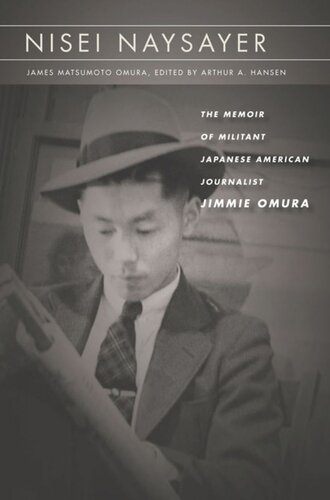

Most ebook files are in PDF format, so you can easily read them using various software such as Foxit Reader or directly on the Google Chrome browser.
Some ebook files are released by publishers in other formats such as .awz, .mobi, .epub, .fb2, etc. You may need to install specific software to read these formats on mobile/PC, such as Calibre.
Please read the tutorial at this link: https://ebookbell.com/faq
We offer FREE conversion to the popular formats you request; however, this may take some time. Therefore, right after payment, please email us, and we will try to provide the service as quickly as possible.
For some exceptional file formats or broken links (if any), please refrain from opening any disputes. Instead, email us first, and we will try to assist within a maximum of 6 hours.
EbookBell Team

4.1
10 reviewsAmong the fiercest opponents of the mass incarceration of Japanese Americans during World War II was journalist James "Jimmie" Matsumoto Omura. In his sharp-penned columns, Omura fearlessly called out leaders in the Nikkei community for what he saw as their complicity with the U.S. government's unjust and unconstitutional policies—particularly the federal decision to draft imprisoned Nisei into the military without first restoring their lost citizenship rights. In 1944, Omura was pushed out of his editorship of the Japanese American newspaper Rocky Shimpo, indicted, arrested, jailed, and forced to stand trial for unlawful conspiracy to counsel, aid, and abet violations of the military draft. He was among the first Nikkei to seek governmental redress and reparations for wartime violations of civil liberties and human rights.
In this memoir, which he began writing towards the end of his life, Omura provides a vivid account of his early years: his boyhood on Bainbridge Island; summers spent working in the salmon canneries of Alaska; riding the rails in search of work during the Great Depression; honing his skills as a journalist in Los Angeles and San Francisco. By the time of the attack on Pearl Harbor, Omura had already developed a reputation as one of the Japanese American Citizens League's most adamant critics, and when the JACL leadership acquiesced to the mass incarceration of American-born Japanese, he refused to remain silent, at great personal and professional cost. Shunned by the Nikkei community and excluded from the standard narrative of Japanese American wartime incarceration until later in life, Omura seeks in this memoir to correct the "cockeyed history to which Japanese America has been exposed."
Edited and with an introduction by historian Arthur A. Hansen, and with contributions from Asian American activists and writers Frank Chin, Yosh Kuromiya, and Frank Abe, Nisei Naysayer provides an essential, firsthand account of Japanese American wartime resistance.